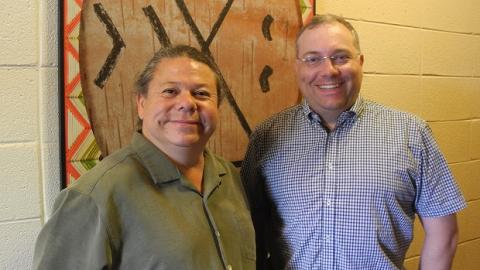 |
Canku Ota
|
 |
|
(Many Paths)
|
||
|
An Online Newsletter
Celebrating Native America
|
||
|
August 2017 - Volume
15 Number 8
|
||
|
|
||
|
Chemist and Mi'kmaq
Scholar Team Up To Study Healing Powers Of Birch Bark
|
||
|
by CBC News
|
||
|
Partnership studying the traditional medicine so it can one day be sold
Two professors at Cape Breton University — a chemist and a Mi'kmaq scholar — have been awarded $150,000 to study the healing powers of birch bark. Tuma Young, assistant professor of L'nu studies, and Matthias Bierenstiel, associate professor of chemistry, are combining traditional knowledge and fundamental science to determine how and why the bark works to soothe skin conditions like eczema and psoriasis. "For many years we didn't really know what exactly was in it that was good for it," said Young. "We just knew it was good for it." The professors brought a birch-bark oil with them to the interview on CBC's Information Morning in Halifax. It stinks of barbecue or fire, and contains lots for a chemist to study. Finding the active ingredients "In this mixture, there are more than 200 different complex ... compounds in there and so we're trying to identify which ones are the active ones," Bierenstiel said. One major component of birch bark is betulin. "It's a plant metabolite that has anti-cancer, anti-inflammatory, anti-microbial activity," Bierenstiel said. "And in fact ... one gram is three times more expensive than gold, if you want to buy it retail." The one-year project received the $150,000 from the Canadian Institutes of Health Research. Interviews with elders The end goal is to create an over-the-counter product that is suitable for people and not too time-consuming. The traditional distillation process for birch-bark oil takes roughly 60 hours to produce only a small amount of the oil. Young said they'll be interviewing dozens of elders at Membertou First Nation in Cape Breton to learn about how they have used birch bark, or masgwi. "Predominantly you're concerned about the benefits and reclaiming and re-remembering the traditional knowledge," Young said. "So part of my work is that if I'm going to get some information on masgwi then .... we have to learn about other medicines that are associated with it." |
||
|
|
|
|
||
|
|
||
| Canku Ota is a free Newsletter celebrating Native America, its traditions and accomplishments . We do not provide subscriber or visitor names to anyone. Some articles presented in Canku Ota may contain copyright material. We have received appropriate permissions for republishing any articles. Material appearing here is distributed without profit or monetary gain to those who have expressed an interest. This is in accordance with Title 17 U.S.C. Section 107. | ||
|
Canku Ota is a copyright ©
2000 - 2017 of Vicki Williams Barry and Paul Barry.
|
||
 |
 |
|
|
The "Canku
Ota - A Newsletter Celebrating Native America" web site and
its design is the
|
||
|
Copyright ©
1999 - 2017 of Paul C. Barry.
|
||
|
All Rights Reserved.
|
||
